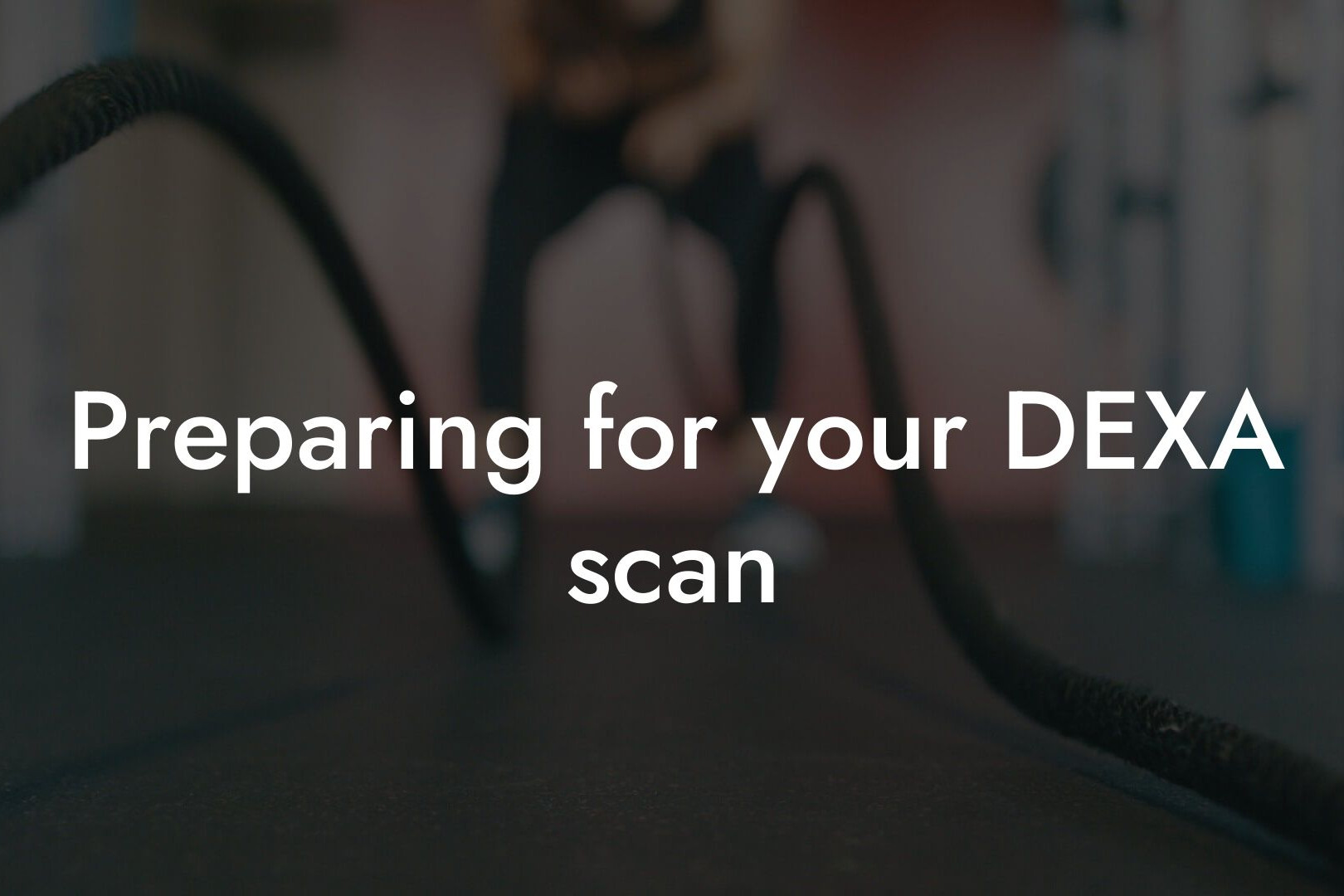A DEXA (Dual-Energy X-ray Absorptiometry) scan is a non-invasive medical imaging test that measures bone density, body composition, and fat distribution. It's a valuable tool for individuals looking to gain a deeper understanding of their overall health and physique. At Tano Performance Group, we utilize DEXA technology to provide our clients with a comprehensive body assessment, empowering them to make informed decisions about their health and wellness.
Table of Contents
How Does a DEXA Scan Work?
A DEXA scan uses X-rays to measure the density of bones and soft tissues. During the scan, you'll lie on a table while a machine arm passes over your body, emitting low-level X-rays. These X-rays are absorbed by your body in varying degrees, depending on the density of the tissues. The machine then calculates the difference in absorption rates to produce detailed images and data.
What Does a DEXA Scan Measure?
A DEXA scan provides a wealth of information about your body, including:
Bone Density: DEXA scans measure bone mineral density (BMD), which is essential for diagnosing osteoporosis, osteopenia, and other bone-related conditions.
Body Composition: DEXA scans accurately measure body fat percentage, lean mass, and visceral fat, helping you understand your overall body composition.
Fat Distribution: The scan provides detailed information about fat distribution, including the amount of fat in your android (abdominal) and gynoid (hip and thigh) regions.
Lean Mass: DEXA scans measure lean mass, which includes muscle, organs, and bone tissue.
What Are the Benefits of a DEXA Scan?
DEXA scans offer numerous benefits, including:
Accurate Body Composition Analysis: DEXA scans provide a precise measurement of body fat percentage, helping you track changes and make informed decisions about your diet and exercise routine.
Early Detection of Bone-Related Conditions: DEXA scans can detect osteoporosis and other bone-related conditions in their early stages, allowing for prompt treatment and prevention of further bone loss.
Personalized Nutrition and Training Plans: With a DEXA scan, you can create tailored nutrition and training plans that address specific areas of improvement, helping you achieve your fitness goals more efficiently.
Monitoring Progress: Regular DEXA scans enable you to track changes in your body composition and bone density over time, ensuring you're on the right path to achieving your health and wellness goals.
Who Should Get a DEXA Scan?
DEXA scans are suitable for anyone looking to gain a deeper understanding of their body composition and bone health. However, they're particularly beneficial for:
High-performing athletes seeking to optimize their body composition and improve performance.
Individuals with a family history of osteoporosis or bone-related conditions.
Those who have experienced significant weight loss or gain.
Individuals with a history of eating disorders or body dysmorphic disorders.
What to Expect During a DEXA Scan?
During a DEXA scan, you can expect:
A quick and painless procedure that typically takes around 10-15 minutes.
You'll be asked to lie on a table and remain still during the scan.
You may be required to remove any metal objects, such as jewelry or glasses, that could interfere with the scan.
A trained technician will operate the machine and guide you through the process.
How Often Should I Get a DEXA Scan?
The frequency of DEXA scans depends on your individual goals and health status. At Tano Performance Group, we recommend:
Initial scan: To establish a baseline measurement of your body composition and bone density.
Follow-up scans: Every 3-6 months to track progress and make adjustments to your nutrition and training plans as needed.
Annual scans: To monitor long-term changes in your body composition and bone health.
A DEXA scan is a powerful tool for anyone looking to gain a deeper understanding of their body composition and bone health. By providing accurate measurements and detailed information, DEXA scans empower individuals to make informed decisions about their health and wellness. At Tano Performance Group, we're committed to helping high-earning professionals like you achieve their fitness goals and optimize their overall health. Contact us today to schedule your DEXA scan and take the first step towards a healthier, stronger you.
Frequently Asked Questions
What is a DEXA scan?
A DEXA (Dual-Energy X-ray Absorptiometry) scan is a non-invasive medical test that measures bone density and body composition, including fat mass and lean mass. It is commonly used to diagnose osteoporosis, monitor bone loss, and assess body fat distribution.
How does a DEXA scan work?
A DEXA scan uses low-level X-rays to measure the density of bones and soft tissues in the body. The test involves lying on a table while an X-ray machine scans the body, usually focusing on the hips, spine, and sometimes the whole body. The machine then calculates the bone density and body composition based on the X-ray absorption.
What is the purpose of a DEXA scan?
The primary purpose of a DEXA scan is to measure bone density, which helps diagnose osteoporosis, a condition characterized by brittle and porous bones. It also helps monitor bone loss over time and assess the effectiveness of osteoporosis treatment. Additionally, a DEXA scan can provide information on body fat distribution, which is useful for athletes and individuals concerned about their physique.
Who needs a DEXA scan?
Individuals who may benefit from a DEXA scan include those with a high risk of osteoporosis, such as postmenopausal women, men over 70, and people with a family history of osteoporosis. Athletes and individuals who want to monitor their body composition and physique may also benefit from a DEXA scan.
How long does a DEXA scan take?
A DEXA scan typically takes around 10-30 minutes, depending on the type of scan and the areas of the body being examined.
Is a DEXA scan safe?
Yes, a DEXA scan is a safe and non-invasive test. It uses low-level X-rays, which are much lower than those used in traditional X-rays. The radiation exposure from a DEXA scan is equivalent to a few days of natural background radiation.
How accurate is a DEXA scan?
A DEXA scan is a highly accurate test for measuring bone density and body composition. The accuracy of the test depends on various factors, including the quality of the machine, the technician's expertise, and the individual's body size and composition.
What do the results of a DEXA scan mean?
The results of a DEXA scan are usually reported in terms of T-scores and Z-scores. T-scores compare the individual's bone density to that of a healthy young adult, while Z-scores compare it to that of someone of the same age and sex. The results can indicate normal bone density, osteopenia (low bone density), or osteoporosis.
Can a DEXA scan detect other health conditions?
While a DEXA scan is primarily used to measure bone density and body composition, it can also detect other health conditions, such as vertebral fractures, sarcopenia (muscle loss), and visceral fat (fat around the organs).
How often should I get a DEXA scan?
The frequency of DEXA scans depends on individual circumstances. For individuals at high risk of osteoporosis, scans may be recommended every 1-2 years. For athletes and individuals monitoring their body composition, scans may be recommended every 6-12 months.
Can I get a DEXA scan if I'm pregnant or breastfeeding?
It is generally recommended to avoid DEXA scans during pregnancy and breastfeeding, as the X-rays may pose a risk to the fetus or baby. However, in some cases, a DEXA scan may be necessary to diagnose osteoporosis or other conditions. Consult with a healthcare provider before undergoing a DEXA scan during pregnancy or breastfeeding.
What is the difference between a DEXA scan and a body fat percentage measurement?
A DEXA scan measures body composition, including fat mass and lean mass, whereas a body fat percentage measurement only calculates the percentage of body fat. A DEXA scan provides a more detailed picture of body composition, including the distribution of fat and lean mass.
Can a DEXA scan help me with my fitness goals?
Yes, a DEXA scan can help you with your fitness goals by providing a detailed picture of your body composition. This information can help you tailor your diet and exercise program to achieve your desired physique and body fat percentage.
How much does a DEXA scan cost?
The cost of a DEXA scan varies depending on the location, type of scan, and healthcare provider. On average, a DEXA scan can cost anywhere from $100 to $500.
Is a DEXA scan covered by insurance?
Insurance coverage for DEXA scans varies depending on the provider and the individual's circumstances. In general, Medicare and many private insurance plans cover DEXA scans for individuals at high risk of osteoporosis or with a history of fractures.
What are the limitations of a DEXA scan?
While a DEXA scan is a valuable tool for measuring bone density and body composition, it has some limitations. For example, it may not accurately measure bone density in individuals with metal implants or osteoarthritis. Additionally, it may not provide information on muscle function or other health markers.
Can I get a DEXA scan at my doctor's office?
Some doctor's offices may offer DEXA scans, but it's more common to have the test performed at a hospital or specialized imaging center. Consult with your healthcare provider to determine the best location for your DEXA scan.
How do I prepare for a DEXA scan?
To prepare for a DEXA scan, avoid wearing clothing with metal fasteners or accessories, and remove any jewelry that may interfere with the scan. You may also be asked to avoid calcium supplements or certain medications that can affect the accuracy of the test.
What happens after the DEXA scan?
After the DEXA scan, the results will be interpreted by a healthcare provider, and you will receive a report outlining your bone density and body composition. Your healthcare provider may discuss the results with you and recommend further testing or treatment if necessary.
Can I get a DEXA scan if I have a pacemaker or implantable device?
Individuals with pacemakers or implantable devices should consult with their healthcare provider before undergoing a DEXA scan. In some cases, the device may interfere with the scan or pose a risk to the individual.
How does a DEXA scan differ from a DXA scan?
DEXA and DXA are often used interchangeably, but DEXA is the more commonly used term in the United States, while DXA is used in other countries. Both terms refer to the same type of scan.
Can a DEXA scan help me monitor my progress?
Yes, a DEXA scan can help you monitor your progress over time, whether you're trying to improve your bone density, reduce body fat, or achieve a specific physique. Regular scans can provide valuable insights into the effectiveness of your diet and exercise program.
Here are some related articles you might love...
- How often should you get a DEXA scan?
- Preparing for your DEXA scan
- Benefits of DEXA scans for professionals
- DEXA scans for athletes vs general population
- Understanding DEXA scan results
- How DEXA scans measure body fat
- DEXA scan vs other body composition tests (e.g., BMI, calipers)
- Cost of a DEXA scan: Is it worth it?
- Accuracy of DEXA scans
Zak Faulkner
Zak Faulkner is a leading authority in the realm of physical health and body composition analysis, with over 15 years of experience helping professionals optimise their fitness and well-being. As one the experts behind Tano Performance Group, Zak has dedicated his career to providing in-depth, science-backed insights that empower clients to elevate their physical performance and overall health.
With extensive knowledge of DEXA technology, Zak specializes in delivering comprehensive body assessments that offer precise data on body fat, muscle mass, bone density, and overall physique. His expertise enables individuals to make informed decisions and achieve their fitness goals with accuracy and confidence. Zak’s approach is rooted in a deep understanding of human physiology, combined with a passion for helping clients unlock their full potential through personalised strategies.
Over the years, Zak has earned a reputation for his commitment to excellence, precision, and client-focused service. His guidance is trusted by top professionals who demand the best when it comes to their health. Whether advising on fitness programs, nutritional strategies, or long-term wellness plans, Zak Faulkner’s insights are a valuable resource for anyone serious about taking their health and fitness to the next level.
At Tano Performance Group, Zak continues to lead our Content Team revolutionising how professionals approach their physical health, offering unparalleled expertise that drives real results.




